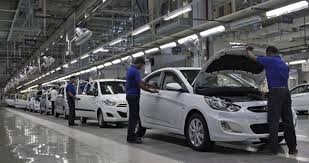The two sectors that contribute most to Indian economy are automobile and Information Technology. With 156 billion dollar industry, IT is the highest contributing sector in GDP of the country. This industry is a major source of foreign currency for the country which is heavily dependent on imports. Since the development of IT sector, India has never faced a balance of payment crisis, it has grown through leaps and bounds without any significant government support or intervention. On the other hand, the automotive industry in India is one of the largest in the world accounting for 7.1 percent of the country’s GDP. The overall domestic automobiles sales increased by 7.01 percent combined annual growth rate (CAGR) between FY13-18 with 24.97 million vehicles getting sold in FY18.
Now the country plans to lead the way in a sector which could be called confluence of automobile and information technology and this being called as CASE- connected, autonomous, shared mobility and electric. The Indian base is already churning out software codes for Mercedes-Benz’s autonomous and connected cars for the future. The driverless cars connected with the Internet of Things (IoT) and are the future of the automobile industry. Another transformation which is taking place is the move to electric vehicles from the traditional petroleum supported vehicles. “There is an Indian hand in every Mercedes-Benz running around the world, such is the depth of talent in India that connected and autonomous technology is the two main areas where the country already plays a key role. Engineers here often say there is nothing an engineer in India can’t do compared to one in Germany. It’s a good place to be digital. The strengths of India is digital know-how, digital mindset, and digital engineering. But it’s not limited to one area,” said Ola Källenius, the global research & development head of the largest luxury car maker.
India is now the second largest Research and Development (R&D) center in this industry. We can get a basic idea of the exponential growth in this sector in the following example The Indian R&D setup for Mercedes-Benz has metamorphosed from a tiny division with 20 staffers in Bangalore, the IT capital of India, a couple of decades ago into a powerhouse of 5,000 engineers that is contributing significantly to new-age technology. The company is already preparing to double its office space as the scope of work expands significantly.
The government of India wants a major shift towards electric vehicles (EVs) by 2030 as committed in the Paris Agreement. The shift to EVs will help the country to reduce its import bills on petroleum purchase because most of the foreign exchange is spent on them. It will also be helpful for the environmental sustainability of the country which is facing several problems due to global warming effects. The focus on future automobile technologies has drawn other manufacturers to India, too, lured by the quality of talent available in the country and affordability. Thousands of engineers based in the country are contributing to developing these critical solutions for the future. Bosch which is the world’s largest auto component maker has its largest R&D Centre in India.
The American giant Ford Motor Company has set up a smart mobility solution division (SMSD) in India. The SMSD partners with civic authorities to try to devise a smart transportation solution that can be adapted to other parts of the world. The General Motors Technical Centre India consists of a design studio and engineering center with a workforce of over 2,000 engineers. Ford India said, in 2016 it would invest $195 million to set up a global technology and business center in Chennai to leverage India as an innovation hub. Likewise, the R&D team of Renault Nissan Technology Business Centre India is helping the Chinese R&D team in developing a small electric car.
The talented pool of engineers which India have in an automobile as well as the IT sector has made the country hub for research in autonomous, connected, and electric vehicles sector. All the global automobile manufacturers have their R&D centers in the country. If the country continues to lead in R&D then it is possible that all the global automobile manufacturing companies will have their manufacturing units in the country which will be a big boost for ‘Make in India’ program. The leadership of the country in IT and its strong presence in automobile sector will make it leader in the production of automobiles in coming decades. The government should provide supporting hands to these R&D centers and the companies which are eager to establish their units in the country.
